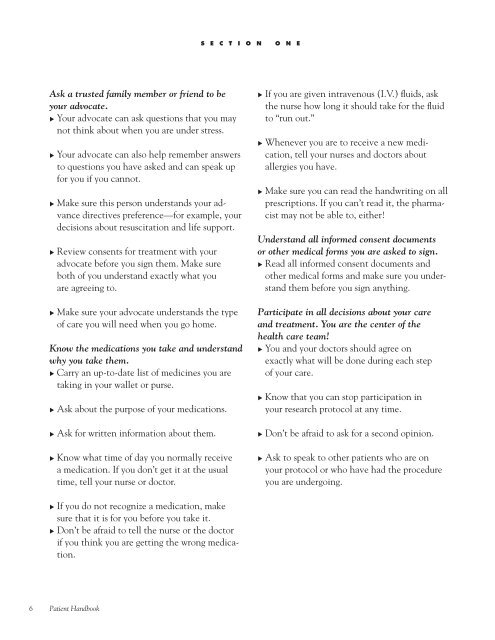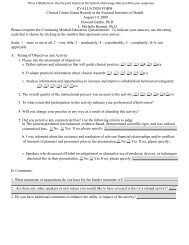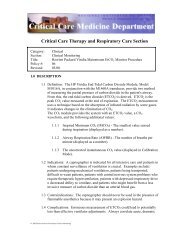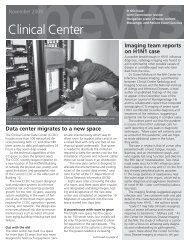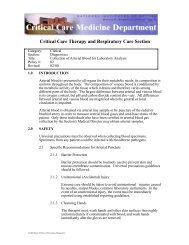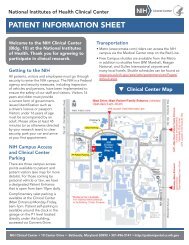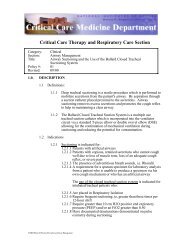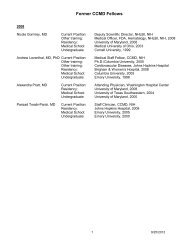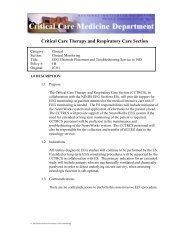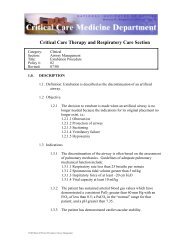Patient Handbook - NIH Clinical Center - National Institutes of Health
Patient Handbook - NIH Clinical Center - National Institutes of Health
Patient Handbook - NIH Clinical Center - National Institutes of Health
You also want an ePaper? Increase the reach of your titles
YUMPU automatically turns print PDFs into web optimized ePapers that Google loves.
Ask a trusted family member or friend to be<br />
your advocate.<br />
u Your advocate can ask questions that you may<br />
not think about when you are under stress.<br />
u Your advocate can also help remember answers<br />
to questions you have asked and can speak up<br />
for you if you cannot.<br />
u Make sure this person understands your advance<br />
directives preference—for example, your<br />
decisions about resuscitation and life support.<br />
u Review consents for treatment with your<br />
advocate before you sign them. Make sure<br />
both <strong>of</strong> you understand exactly what you<br />
are agreeing to.<br />
u Make sure your advocate understands the type<br />
<strong>of</strong> care you will need when you go home.<br />
Know the medications you take and understand<br />
why you take them.<br />
u Carry an up-to-date list <strong>of</strong> medicines you are<br />
taking in your wallet or purse.<br />
u Ask about the purpose <strong>of</strong> your medications.<br />
u Ask for written information about them.<br />
u Know what time <strong>of</strong> day you normally receive<br />
a medication. If you don’t get it at the usual<br />
time, tell your nurse or doctor.<br />
u If you do not recognize a medication, make<br />
sure that it is for you before you take it.<br />
u Don’t be afraid to tell the nurse or the doctor<br />
if you think you are getting the wrong medication.<br />
6 <strong>Patient</strong> <strong>Handbook</strong><br />
S E C T I O N O N E<br />
u If you are given intravenous (I.V.) fluids, ask<br />
the nurse how long it should take for the fluid<br />
to “run out.”<br />
u Whenever you are to receive a new medication,<br />
tell your nurses and doctors about<br />
allergies you have.<br />
u Make sure you can read the handwriting on all<br />
prescriptions. If you can’t read it, the pharmacist<br />
may not be able to, either!<br />
Understand all informed consent documents<br />
or other medical forms you are asked to sign.<br />
u Read all informed consent documents and<br />
other medical forms and make sure you understand<br />
them before you sign anything.<br />
Participate in all decisions about your care<br />
and treatment. You are the center <strong>of</strong> the<br />
health care team!<br />
u You and your doctors should agree on<br />
exactly what will be done during each step<br />
<strong>of</strong> your care.<br />
u Know that you can stop participation in<br />
your research protocol at any time.<br />
u Don’t be afraid to ask for a second opinion.<br />
u Ask to speak to other patients who are on<br />
your protocol or who have had the procedure<br />
you are undergoing.


